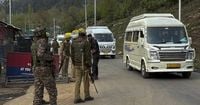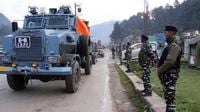A group of tourists was fired upon in Baisaran Valley of Pahalgam, Jammu & Kashmir, on April 22, 2025, resulting in multiple injuries and at least one confirmed death. The incident, which occurred just ahead of the Amarnath Yatra pilgrimage season, has raised significant concerns about security in the region, especially as it is a popular destination for visitors.
According to reports, the attack took place around 2:30 PM when gunshots were heard in the picturesque Baisaran Valley, often referred to as "mini-Switzerland" due to its scenic beauty. Sources indicate that at least 25 people were killed, with several others injured in what is being described as one of the deadliest attacks in recent years. Eyewitnesses reported that a group of tourists from Rajasthan was targeted during the assault.
The Resistance Front (TRF), an offshoot of the Pakistan-based terror group Lashkar-e-Taiba, has claimed responsibility for the attack, although security agencies are still verifying this information. Initial reports suggest that 5-6 people, including locals, were injured, and the police confirmed that five persons were hurt in the crossfire.
Pahalgam, located in the Anantnag district, is a crucial stop for pilgrims traveling to the Amarnath Cave, which is expected to attract thousands of devotees starting July 3, 2025. The Yatra is a significant event in the region, and this attack appears to be an attempt by terrorists to disrupt the pilgrimage.
In the wake of the attack, security forces launched a massive search operation to hunt down the assailants. The area has been cordoned off, and an evacuation process is underway for the injured. The Pahalgam Sub-Divisional Magistrate, Qaiser Ali, confirmed the ongoing efforts to secure the site, noting that the narrow paths leading to the meadows pose challenges for rescue operations.
Union Home Minister Amit Shah is expected to visit Jammu and Kashmir to assess the situation personally. He condemned the attack, stating on social media, "Those involved in this dastardly act of terror will not be spared, and we will come down heavily on the perpetrators with the harshest consequences." His remarks reflect the government's commitment to addressing security concerns in the region.
Prime Minister Narendra Modi also expressed his condolences to the victims' families and emphasized the need for immediate action. He stated, "Condolences to those who have lost their loved ones. I pray that the injured recover at the earliest. All possible assistance is being provided to those affected." Modi's comments underscore the gravity of the situation and the government's focus on ensuring safety for tourists and residents alike.
Local authorities have reported that the area is typically bustling with tourists, especially during this time of year, making the attack particularly shocking. Eyewitness accounts describe the chaos that ensued as gunfire erupted. A woman survivor recounted her harrowing experience, stating, "My husband was shot in the head while seven others were also injured in the attack." Her plea for help highlights the urgent need for medical assistance in the aftermath of such violence.
As the situation develops, it is clear that the attack has far-reaching implications for tourism in Jammu and Kashmir. The region, which relies heavily on its tourism sector, may see a decline in visitors in light of this incident. The government and local leaders are now faced with the challenge of restoring confidence among potential tourists while ensuring that security measures are adequately enforced.
Jammu and Kashmir Chief Minister Omar Abdullah condemned the attack, labeling it an "abomination" and expressing disbelief at the targeting of visitors. He stated, "This attack on our visitors is an abomination. The perpetrators of this attack are animals, inhuman, and worthy of contempt." Abdullah's strong words reflect the sentiments of many in the region who view such acts of violence as not only a threat to safety but also to the region's reputation.
As rescue and recovery efforts continue, the focus will also shift to the investigation into the attackers' identities and motives. Security forces are working diligently to gather intelligence and prevent further incidents. The attack has reignited discussions about the ongoing threat of terrorism in the region and the need for robust security measures to protect both locals and tourists.
Looking ahead, the upcoming Amarnath Yatra poses additional challenges for security forces, who must balance facilitating the pilgrimage while ensuring the safety of all participants. The government will likely implement heightened security protocols to mitigate risks and reassure the public.
In conclusion, the tragic events in Pahalgam serve as a stark reminder of the complexities surrounding security in Jammu and Kashmir. The region's beauty and cultural significance are often overshadowed by violence, and incidents like this threaten to undermine efforts to promote peace and stability. As authorities respond to this latest attack, the hope remains that such violence can be curtailed, allowing the region to thrive once more.








